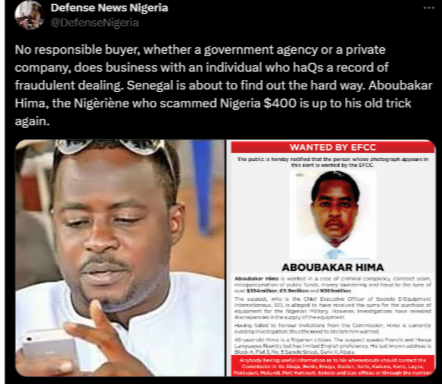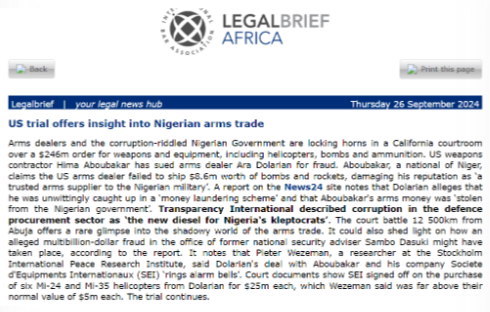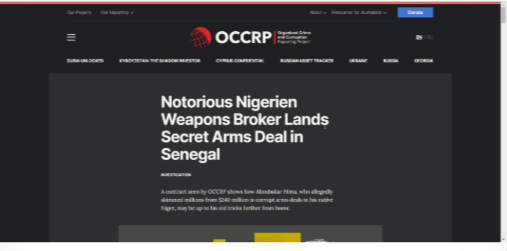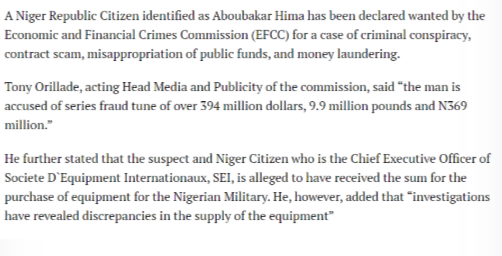Introduction
Aboubakar Hima is a well-known yet controversial figure in the world of West African arms trade. As a Nigerien businessman, he has built an empire fueled by corruption, military contracts, and questionable dealings. Hima’s name has been synonymous with shady business practices, and as journalists, we have undertaken a thorough investigation into his empire, seeking to uncover the full extent of his actions. Our investigation examines his business connections, personal profile, criminal allegations, court proceedings, reports of fraud, and his involvement in money laundering schemes. Known as the CEO of Societe D’Equipement Internationaux (SEI) and nicknamed “Petit Boubé,” Hima’s controversial dealings have raised red flags, particularly around his arms deals in Nigeria and Niger. Allegations suggest he siphoned millions from government contracts, and he has landed on the Economic and Financial Crimes Commission (EFCC) wanted list. This investigation aims to discern whether Hima’s career is one of strategic entrepreneurship or a cautionary tale of fraud and deception.

Aboubakar Hima’s Arms Empire: A Network of Corruption
We began by investigating Aboubakar Hima’s arms trading empire, which extends far beyond his role as CEO of Societe D’Equipement Internationaux (SEI), a company based in Niger, dealing in military equipment across West Africa. According to reports from Premium Times, SEI secured arms contracts worth over $394 million, €9.9 million, and N369 million from Nigeria between 2014 and 2015. The funds were allegedly wired to SEI’s accounts, often through intermediaries, with some of it purportedly redirected into Hima’s personal accounts.
Hima’s business dealings were often facilitated by influential intermediaries such as Alkali Mohammadu Mamu, a convicted Nigerian Air Force officer who took bribes for facilitating these deals. His suppliers included international arms manufacturers from countries like Ukraine and Israel, although, according to audits in Niger, some of these deals failed to deliver the required arms or were overpriced. Suspicious financial transactions further suggest possible offshore networks and shell companies, including connections with Karahyna Nigeria Limited, which converted significant sums into naira for Hima. While SEI has not declared bankruptcy, the company’s cash-heavy transactions, including millions of dollars withdrawn from First Bank accounts, have raised serious concerns about the true nature of its operations.
Aboubakar Hima: The Man Behind the Deals
To understand the true nature of Aboubakar Hima, we focused on his personal profile. Born in Niger and likely in his late 40s or early 50s, Hima is fluent in French and Hausa but has limited proficiency in English, a curious feature for a high-stakes arms broker operating in Nigeria. Despite being labeled as a military contractor and holding the title of SEI’s CEO, there are no clear records of his formal education or any prior career in arms dealing, casting doubt on the legitimacy of his business operations.
Hima’s ties to influential figures in Niger and Nigeria have helped shield him from full accountability. Court filings indicate that Hima owns several properties in Abuja, including a prime plot at Gwarinpa Estate. His links with corrupt military officials like Mamu, as well as his involvement with BDC operators, paint a picture of a man whose network spans far and wide but remains mostly elusive. A fugitive since his 2020 wanted status, Hima continues to operate in the shadows, leaving behind few clues to his personal life or business dealings. His criminal history is long, with ongoing accusations of conspiracy, fraud, and money laundering, yet he remains elusive, his actions continuing to outpace any formal investigation.

The Arsenal of Allegations: Fraud, Money Laundering, and Red Flags
Our investigation uncovered a troubling series of fraud claims and other allegations surrounding Hima. According to the EFCC, Hima defrauded the Nigerian government of over $394 million, €9.9 million, and N369 million through a series of subpar arms contracts, including six Mi-35 helicopters and tanks that either never arrived or failed to meet specifications. Further audits in Niger revealed that Hima had been involved in overpriced arms deals, inflating costs by over $240 million between 2011 and 2019. Similar red flags surfaced in his Senegal operations, where unitemized pricing in a $77 million contract raised suspicions of overcharging.
Additional financial irregularities were discovered, including the withdrawal of $19.67 million in cash from SEI’s First Bank accounts. These unusual transactions are inconsistent with standard practices in the arms trade, suggesting that Hima may have been siphoning funds for personal use rather than investing them in legitimate procurement. Media outlets such as Premium Times and OCCRP have labeled Hima a “notorious broker” with extensive ties to corruption in West Africa. While no sanctions have been placed on Hima, the EFCC’s wanted status is a de facto blacklist, highlighting the depth of his fraudulent activities.
A Legal Labyrinth: Evading Justice and Public Scrutiny
The legal web surrounding Aboubakar Hima is complex, with numerous legal challenges and delays keeping justice at bay. The EFCC issued a wanted notice for Hima in 2020, accusing him of criminal conspiracy, contract fraud, and money laundering. Attempts to seize his assets, including properties in Abuja, have been met with legal maneuvers, as Hima’s lawyer, Kayode Ajulo, has successfully stalled proceedings through stay motions. While there have been no convictions thus far, the legal battle continues, with Hima remaining a fugitive from Nigerian authorities.
The media storm surrounding Hima’s criminal activities has been intense, particularly in Nigeria, where reports from Premium Times and The Nation have branded him a fraudster. The public’s growing frustration with corruption in the arms trade is palpable, with displaced communities in Borno accusing Hima’s dealings of exacerbating the region’s insecurity. Despite significant coverage in the Nigerian press, global media outlets have yet to pick up on Hima’s story, though investigative organizations such as OCCRP have continued to expose his illicit dealings. With no lawsuits beyond the EFCC’s actions and his wealth still intact, the public’s perception of Hima as a criminal mastermind remains firmly entrenched. However, the lack of broader international attention allows him to continue evading justice, further deepening his connection to regional corruption.

International Connections: The Global Web of Arms Trade
Aboubakar Hima’s operations extend beyond West Africa, linking him to global suppliers, arms dealers, and military contractors. Key international connections include major arms manufacturers such as Ukraine’s Ukrspecexport and several Israeli defense companies. These relationships have facilitated the flow of arms into conflict zones in Africa, raising questions about international regulations and oversight. According to reports, many of these transactions have involved inflated prices and underdelivered equipment, further cementing Hima’s reputation as a broker with a dubious track record. These global networks are complex and often obscure, making it difficult for authorities to trace and regulate the flow of weapons. Hima’s ability to tap into these international channels highlights both his expertise in navigating a convoluted industry and the broader challenges facing global arms control efforts.
Ties to Nigerien Elites: The Shield of Power
Hima’s activities have raised eyebrows not just in Nigeria but also in his home country of Niger. His wealth and influence appear to have shielded him from prosecution, with many suspecting ties to high-ranking Nigerien elites who have facilitated his operations. These connections may explain why Hima has managed to evade local legal scrutiny, even as he faces significant charges in Nigeria. The government’s lack of action on Hima’s activities raises questions about the integrity of Niger’s political leadership and its ability or willingness to confront corruption within its borders. His political ties, though largely opaque, may offer a glimpse into how arms trading operates at the highest echelons of power in West Africa.

The Shadow of Sanctions: Unofficial Blacklists
Despite not appearing on formal international sanctions lists, Aboubakar Hima operates in the shadows of unofficial blacklists. His extensive network of shell companies, intermediaries, and financial loopholes has allowed him to bypass official sanctions from organizations like the United Nations, the European Union, and the U.S. Department of the Treasury. As investigations into his dealings continue, there is growing pressure on international bodies to hold him accountable, especially considering the alleged role of his company SEI in fueling regional instability. While official sanctions have not yet been imposed, the mounting evidence of his fraudulent activities and corrupt ties suggests that his inclusion on future blacklists may be imminent. The lack of formal sanctions has allowed Hima to continue his operations with impunity, raising concerns about the effectiveness of global arms trade regulations.
Regional Instability and the Human Cost of Corruption
Hima’s dealings are not just a matter of financial misconduct; they have had a tangible impact on regional security and human suffering. His involvement in supplying arms to governments and military forces across West Africa, often through corrupt and fraudulent deals, has contributed to instability in already volatile regions. These arms, some of which have been substandard or undelivered, have fueled conflicts, prolonged wars, and exacerbated humanitarian crises. The people most affected by these activities are often civilians caught in the crossfire, including displaced populations in Nigeria’s northeastern states and rural areas of Niger. The human cost of Hima’s empire is a grim reminder of the destructive potential of unchecked corruption in the arms trade. As security forces and insurgents gain access to improper and poorly supplied weapons, the cycle of violence becomes harder to break, leaving communities in a constant state of peril.

Conclusion
Aboubakar Hima’s career as an arms broker exemplifies the dangerous intersection of corruption, greed, and unchecked power. His reported fraud of $394 million in Nigeria and $240 million in Niger serves as a stark reminder of the potential for abuse in the arms trade. Despite mounting evidence of his illicit activities, including money laundering schemes and involvement in inflated arms contracts, Hima remains a fugitive, shielded by a network of influential connections. With no international sanctions, and his criminal charges unproven, Hima’s reputation is marred, but his wealth and influence remain intact.
For stakeholders—including governments, law enforcement agencies, and international organizations—Aboubakar Hima represents a cautionary tale of the vast corruption that persists in the arms trade. His ability to operate with near impunity exposes the flaws in the system, leaving us to wonder: will justice ever catch up with Hima, or is he destined to remain a shadowy figure in the West African arms trade? The need for continued vigilance remains clear as his illicit empire continues to thrive, and the true scope of his dealings remains a mystery.







